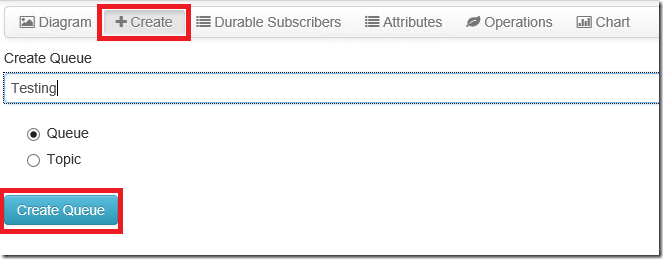Integrating Apache ActiveMQ with BizTalk Server 2013 using WCF-WebHTTP adapter and REST API
Introduction
In this blog post I will present a very simple solution to integrate with Apache ActiveMQ platform. Actually I got this question from a friend I could not believe how easy it is to integrate with this platform using the new BizTalk 2013 WCF-WebHTTP adapter. The adapter provides many features out of the box that really makes the integration engineer life much easier and better.
In this scenario I have installed Apache ActiveMQ on a private VM, created a test queue and made sure that I am able actually to send messages to that test queue. The target then was to create a way to receive messages from this queue to BizTalk server.
Discussion
The following procedure is what I did to perform this POC.
1- First I started by installing ActiveMQ and to my surprise that was super easy. So I downloaded the binaries from here and I also downloaded the JDK from here. I installed the JDK then extracted the ActiveMQ to any folder of my choice.
2- I then had to set the JAVA_HOME environment variable (I do not know why the JDK setup did not do this) but I did that manually to point to the JDK folder as C:\Program Files\Java\jdk1.7.0_45
3- I then started the ActiveMQ platform by browsing to the folder where I extracted it and then typing the command:
bin\activemq
4- Then I opened the new administration portal using the URL (https://localhost:8161/hawtio) then I logged in using the username admin and password admin.
6- Then I created a new Queue called “Testing” by clicking “Create” then “Create Queue”

7- Click on the queue on the left then click “Send” then make sure you change the format to XML type in a valid XML message and finally send the message.

8- If you now go to the browse of the queue you will find that the message is ready for pickup as per below:

9- Now the ActiveMQ supports the REST API to be able to pick up messages (or post them) the address is as follows (https://localhost:8161/api/message/Testing?type=queue&clientId=BTSconsumer). So note this address as we will use it later in BizTalk.
10- Now let’s go to the BizTalk administration console. I created a new send port to be able to pick up messages from the Queue using the WCF-WebHTTP adapter. So I created a new send port and configured it as follows:

11- Then click configure and change the address and operation as follows:

12- One key point here (and a new feature that I really like about this new adapter) is that if you are using the HTTP GET operation then you cannot sent anything in the BODY of the HTTP request. But BizTalk out of the box have to send a message so the adapter solved this by adding a key feature called suppress outbound messages body for verbs GET, so you need to configure this as below:

13- Now I need a way to issue a GET verb using this send port. So usually what you would configure is a scheduled task adapter to schedule checking of messages from the queue. In my case I wanted something simple and without installing anything else on the VM. So I configure a messaging approach to issue a GET verb after I send an empty file through a file receive location and then created another file send port to pick up the final message received form the Queue and write it to a folder.
14- Started everything and BINGO worked like a charm J I have sent the message to the queue and then I drop the empty file to the input folder to issue a GET verb and finally the sent message is written to the output folder as follows:
<Sample>Input again!!</Sample>
Conclusion
The conclusion here is that REST is very powerful and makes you do amazing things. I really think everything should support REST and the other very important conclusion is that I need to thank the BizTalk product group to support this out of the box in BizTalk Server 2013 J
